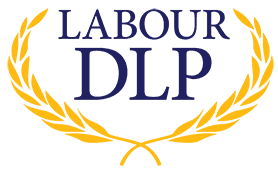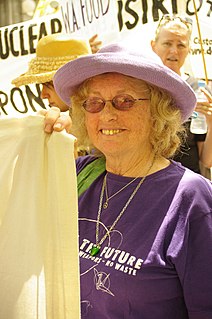
The Australian Democrats is a centrist political party in Australia. Founded in 1977 from a merger of the Australia Party and the New Liberal Movement, both of which were descended from Liberal Party dissenting splinter groups, it was Australia's largest minor party from its formation in 1977 through to 2004 and frequently held the balance of power in the Senate during that time.

The Democratic Labour Party (DLP), formerly the Democratic Labor Party, is an Australian political party. It broke off from the Australian Labor Party (ALP) as a result of the 1955 ALP split, originally under the name Australian Labor Party (Anti-Communist), and was renamed the Democratic Labor Party in 1957. In 1962, the Queensland Labor Party, a breakaway party of the Queensland branch of the Australian Labor Party, became the Queensland branch of the DLP.

Martin John Ferguson is an Australian former Labor Party politician who was the Member of the House of Representatives for Batman from 1996 to 2013. He served as Minister for Resources and Energy and Minister for Tourism in the Rudd and Gillard Governments from 2007 to 2013.
Elections in Australia take place periodically to elect the legislature of the Commonwealth of Australia, as well as for each Australian state and territory and for local government councils. Elections in all jurisdictions follow similar principles, although there are minor variations between them. The elections for the Australian Parliament are held under the federal electoral system, which is uniform throughout the country, and the elections for state and territory Parliaments are held under the electoral system of each state and territory.
This is a list of members of the Australian Senate from 1987 to 1990. It consisted of twelve senators for each of the six states of Australia and two senators representing each of the Northern Territory and the Australian Capital Territory. All members were elected at the 1987 election following a double dissolution of both houses of parliament, rather than the normal case of only half of the state senators facing election.
This is a list of members of the Australian Senate from 1985 to 1987. The number of senators was increased from ten to twelve senators for each of the six states of Australia. The representation of the Northern Territory and the Australian Capital Territory remained at two senators each. This would give a total of 76 senators in the Senate.

Greens Western Australia, commonly known as the Greens WA, is a member party of the Australian Greens in Western Australia. The Greens (WA) was formed following the merger of the Western Australian Green Party with the Green Earth Alliance composed of the Vallentine Peace Group and Alternative Coalition in 1990. The Party became officially affiliated with the Australian Greens in 2003.
Ruth Nancy Coleman was an Australian politician. She was a member of the Australian Labor Party (ALP) and served as a Senator for Western Australia from 1974 to 1987. She was prominent in the anti-nuclear movement.
Jean Isabel Melzer was an Australian Senator representing the Australian Labor Party and the state of Victoria.

Josephine Vallentine is an Australian peace activist and politician, a former senator for Western Australia. She entered the Senate on 1 July 1985 after election as a member of the Nuclear Disarmament Party but sat as an independent and then as a member of the Greens Western Australia from 1 July 1990. She resigned on 31 January 1992.

The 1990 Australian federal election was held in Australia on 24 March 1990. All 148 seats in the House of Representatives and 40 seats in the 76-member Senate were up for election. The incumbent Australian Labor Party led by Bob Hawke defeated the opposition Liberal Party of Australia led by Andrew Peacock with coalition partner the National Party of Australia led by Charles Blunt despite losing the nationwide popular and two-party-preferred vote. The election saw the reelection of a Hawke government, the fourth successive term.

The 1987 Australian federal election was held in Australia on 11 July 1987, following the granting of a double dissolution on 5 June by the Governor-General Sir Ninian Stephen. Consequently, all 148 seats in the House of Representatives as well as all 76 seats in the Senate were up for election. The incumbent Australian Labor Party, led by Prime Minister Bob Hawke, defeated the opposition Liberal Party of Australia, led by John Howard and the National Party of Australia led by Ian Sinclair. This was the first, and to date only, time the Labor Party won a third consecutive election.
Irina Patsi Dunn is an Australian writer, social activist and filmmaker, who served in the Australian Senate between 1988 and 1990. Born in Shanghai, Dunn grew up in Australia and studied at the University of Sydney.

The 1919 Australian federal election was held on 13 December 1919 to elect members to the Parliament of Australia. All 75 seats in the House of Representatives and 19 of the 36 seats in the Senate were up for election. The incumbent Nationalist Party government won re-election, with Prime Minister Billy Hughes continuing in office.
William Robert Wood is a British-born Australian who has campaigned on peace and justice issues. He was elected to the Australian Parliament in the 1987 elections as Senator for New South Wales, however the High Court subsequently declared his election was invalid as he was not an Australian citizen at the time.

The 2013 Australian federal election to elect the members of the 44th Parliament of Australia took place on 7 September 2013. The centre-right Liberal/National Coalition opposition led by Opposition leader Tony Abbott of the Liberal Party of Australia and Coalition partner the National Party of Australia, led by Warren Truss, defeated the incumbent centre-left Labor Party government of Prime Minister Kevin Rudd by an 18-seat 3.6 percentage point two-party swing resulting in a landslide win for the Coalition. Labor had been in government for six years since first being elected in the 2007 election. This election marked the end of the Rudd-Gillard-Rudd Labor government and the start of the 9 year long Abbott-Turnbull-Morrison Liberal-National Coalition government. Abbott was sworn in by the Governor-General, Quentin Bryce, as Australia's new Prime Minister on 18 September 2013, along with the Abbott Ministry. The 44th Parliament of Australia opened on 12 November 2013, with the members of the House of Representatives and territory senators sworn in. The state senators were sworn in by the next Governor-General Peter Cosgrove on 7 July 2014, with their six-year terms commencing on 1 July.
Michael Antony Denborough was an Australian academic and medical researcher who founded the Nuclear Disarmament Party.
The Nunawading Province by-election of 1985 was a by-election in the Nunawading Province for the Victorian Legislative Council held on 17 August 1985. It was ordered by the Court of Disputed Returns after it found that the Chief Electoral Officer drew a name at random when the 1985 Victorian state election had resulted in a dead heat between the top two candidates. The Chief Electoral Officer had drawn the name of the ALP candidate. After the Court ordered a new election, the outcome was that the Liberal candidate Rosemary Varty was returned.

The following tables show state-by-state results in the Australian Senate at the 1990 federal election. Senators total 31 coalition, 32 Labor, one WA Green, three non-coalition National, eight Democrats, and one independent. Senator terms are six years, and took their seats from 1 July 1990, except the territories who took their seats immediately.

The following tables show state-by-state results in the Australian Senate at the 1987 federal election. This election was a Double dissolution, which means that all 12 senators from each state were up for election. Senators total 29 coalition, 32 Labor, one Jo Vallentine Peace Group, four non-coalition National, seven Democrats, one Nuclear Disarmament and one Independent. Territory Senators served until the next federal election. State Senator terms were nominally three or six years, backdated from 1 July 1987. The Senate used the order-elected method to allocate three- and six-year seats, despite provisions for the AEC to conduct a special recount.









